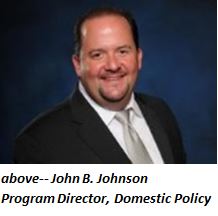John B. Johnson, Program Director, Domestic Policy
Two others also, who were criminals, were led away to be put to death with him. When they came to the place that is called The Skull, they crucified Jesus there with the criminals, one on his right and one on his left.—One of the criminals who were hanged there kept deriding him and saying, “Are you not the Messiah? Save yourself and us!” But the other rebuked him, saying, “Do you not fear God, since you are under the same sentence of condemnation? And we indeed have been condemned justly, for we are getting what we deserve for our deeds, but this man has done nothing wrong.” Then he said, “Jesus, remember me when you come into your kingdom.” He replied, “Truly I tell you, today you will be with me in Paradise.” (Luke 23 32; 39-43)
 The penitent thief and second chances
The penitent thief and second chances
Luke’s account of the crucifixion of Jesus on the cross with two other “criminals” intrigues me. When I read this Gospel, I find myself wondering about the man who made it to paradise with Jesus that day. Because of his penitence and faith, Jesus gives him a second chance for redemption and for paradise.
I think two of the most important sentences in the English language are I’m sorry and thank you.Lent is a time of penitence and forgiveness. The penitent thief’s story is, for me, one of the all-time best “second chances.” I like second chances—and throughout my career, I certainly have needed them. Second chances are part of our national character in everything from bankruptcy for businesses or individuals, to youth who make mistakes and find themselves in the juvenile justice system. Individually or as a society, offering a second chance is a Gospel value.
One of my heroes—who I had the pleasure of meeting in person (and I even bought him a Coca-Cola)—is former Archbishop Desmond Tutu, who said, “No one is beyond redemption.” Forgiveness is more for us than it is for the one who may sin against us.
The opportunity to serve the ELCA in our Washington, DC Advocacy Office as the Program Director of Domestic Policy feels like a second chance for me because I served in a similar capacity with the Episcopal Church some years ago. I left that job for new opportunities and experiences that were both wonderful, challenging and no-so-great. What those experiences taught me, however, was that I was “operating outside of my call.” Getting back to faith-based advocacy is a great blessing for me and I love that I have an opportunity to bring second chances into my professional work.
Second Chance Reauthorization Act and Smarter Sentencing Act
Criminal justice reform is becoming a passion of mine in large measure because of my faith in redemption and second chances. In the last Congress, several promising bi-partisan bills were introduced that would reduce the US prison population, reduce mandatory minimum requirements for non-violent drug offences and improve reentry services to reduce recidivism for the formerly incarcerated. The Second Chance Reauthorization Act and the Smarter Sentencing Act are two key opportunities to reform our criminal justice system in the US.
- The Second Chance Act was signed into law by George W. Bush in 2009, this legislation provides federal resources to states for reentry programs, but could do more through the reauthorization process with a number of enhancements directed at incarcerated young people—including additional mentoring programs, transitional services, and new granting opportunities.
- The Smarter Sentencing Act makes incremental reform that allows federal judges to appropriately sentence certain non-violent drug offenders below existing mandatory minimum sentences. The bill provides federal judges some case-by-case review of each offender to prevent overly harsh sentencing. Finally, the bill refocuses the resulting savings into crime and recidivism prevention programs and improves transparency through public access to statutory and regulatory criminal provisions.
When legislative action begins in earnest on these important reform opportunities, I hope Lutherans and all of our Christian brothers and sisters will find their voice and call on our Senators, Representatives and the President to pass these bills.
Thank you for the opportunity to reflect and to share the ministry of advocacy with so many of you. May you have a good and reflective Lent.
